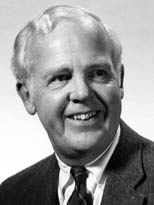Louis Menand III, a celebrated teacher and political scientist who served three consecutive MIT administrations in senior leadership roles, died Jan. 30 of complications from cardiac surgery. He was 85.
Menand came to MIT in 1968 as assistant to the provost under MIT President Howard Johnson; later, he was special assistant to provosts under former president Jerome Wiesner and Paul Gray, president emeritus and professor of electrical engineering and computer science, emeritus.
"Louis fell in love with this special place even as the Institute embraced him. An erudite, cosmopolitan, engaging individual with a fine sense of humor, he will be remembered with respect and much affection by his students, his colleagues across the Institute and by me," said Gray.
In addition to his administrative responsibilities, Menand was a senior lecturer in the political science department where he taught American politics, winning the Everett Moore Baker Memorial Award for Excellence in Undergraduate Teaching in 1988. He was well known for a course he developed, The Supreme Court and Constitutional Processes.
Professor of Economics Jonathan Gruber SB '87, a former student of Menand, said, "He was nothing less than an intellectual giant. Louis provided me with a moral compass for thinking about the world and policy issues in the world. There is no way I would be where I am today without his incredible influence. I will miss him dearly."
Menand's career reflected his commitment to personal and public standards of living a good life, one that provides centering and satisfaction with one's own accomplishments, according to his wife, Catherine.
Outside of MIT, Menand was a consultant on higher education; a member the American Civil Liberties Union, where he served as vice-chair of the Academic Freedom Committee; and a member of the Massachusetts ACLU board.
An unabashed Democrat, Menand was an advocate for civil rights throughout his life. His personal passions were music, especially opera, and the natural environment. He loved mountains both as scenery and as ski slopes. He was a member of the St. Botolph Club in Boston.
Menand was a native of Menands, NY, a town named for his great-grandfather. He received his BA in political science from Middlebury College in 1944 and his PhD from the Maxwell School of Public Administration of Syracuse University in 1952. In 1943, at the age of 20, he enlisted in the U.S. Navy; he spent two years in the Pacific commanding a landing craft and participating in eight invasions before leaving the service in 1946 as a lieutenant, junior grade.
Before coming to MIT, Menand was a Washington-based consultant to the Office of Economic Opportunity for Upward Bound, a federal program to help disadvantaged high school students prepare for college. He was dean of Bradford College from 1956 to 1966. He also held faculty positions at Dartmouth College and Vassar College.
Menand is survived by his wife, Catherine (Shults), of Boston; a son, Louis, of Cambridge and New York City; a daughter, Constance Margowsky of Somersworth, N.H.; a son, Nicholas Brock of Hammonton, N.J.; and four grandchildren.
The funeral is private. In lieu of flowers, donations may be sent to Tutoring Plus of Cambridge, a community program assisting local high school students, where Menand had served as president of the board of directors.
A version of this article appeared in MIT Tech Talk on February 13, 2008 (download PDF).






